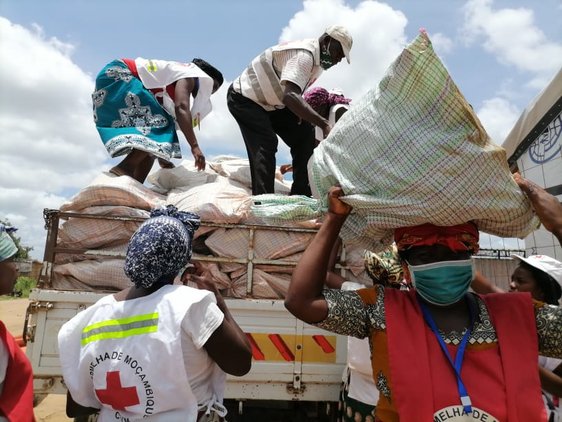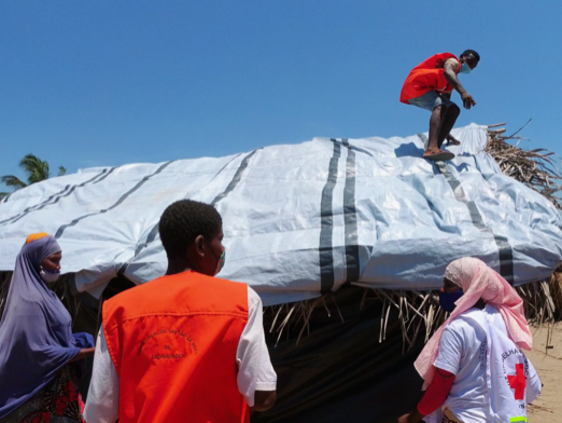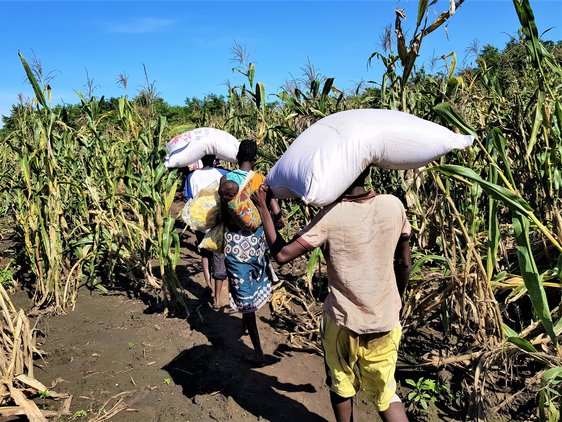Boosting support for Anticipatory Action: Meeting between the Chairwoman of the Parlimentary Committee on Human Rights and Humanitarian Assistance (Germany), IFRC Secretary General and German Red Cross Secretary General
20th April 2021
Today, a high-level meeting took place between Gyde Jensen, Chairwoman of the Parliamentary Committee on Human Rights and Humanitarian Assistance, Mr. Jagan Chapagain, the Secretary General of IFRC, and Mr. Christian Reuter, the Secretary General of the German Red Cross. Anticipatory action was one of the two key topics discussed during the meeting, the other topic being Localisation and the role of the Red Cross Red Crescent in the Covid-19 response.
During the meeting, the strength of the Red Cross Red Crescent Forecast-based financing approach was highlighted by the IFRC and GRC Secretary Generals, emphasising how the approach builds National Societies' capacity and ownership enabling a more reliable, sustainable and globally reaching system for anticipatory action. During 2020, despite the ongoing Covid-19 pandemic, the Forecast-based Action by the DREF was activated 5 times, enabling early action to mitigate the impact of Dzud in Mongolia, Cyclone and Floods in Bangladesh, Volcanic Ashfall in Ecuador, and Cyclone in Mozambique. These successful activations raised the importance of having effective plans and pre-arranged financing in place that function under conditions of compounding crises.
Strengthening knowledge exchange
The German Red Cross Secretary General demonstrated the strong role the German Government’s Federal Foreign Office has played, and continues to play, in creating the shift in the humanitarian system from response towards anticipatory action. The German Government was encouraged to continue to support anticipatory action and expand this engagement, especially its support to the Red Cross Red Crescent for building Forecast-based financing systems and capacities with National Societies in high-risk countries, investing in learning, exchange and evidence-building and financing early action activities. IFRC and GRC reaffirmed their continued support for the Anticipation Hub, a platform created to sustain knowledge exchange, learning and collaboration on anticipatory action for practitioners, scientists and policy-makers, complimenting the ongoing Global and Regional Dialogue Platforms on Anticipatory Humanitarian Action.
Scaling up to more hazards and compounding risks
The IFRC and GRC emphasised the need for continued investment in scaling up anticipatory action, to reach more people, cover more geographic areas at risk, more hazards including non-weather related hazards and accounting for compounding risks (as demonstrated through the global pandemic). Both recognised that such emerging applications of anticipatory action are complex and it will take time to adapt existing methodologies, tools and financing mechanisms, and to identify the best approach for anticipatory action in collaboration with local actors.
“We really need to expand anticipatory action beyond climate-related disasters”
Jagan Chapagain – Secretary General IFRC
Integrating anticipatory action into national and regional disaster risk management
The importance of integrating anticipatory action into local, national and regional disaster risk management systems was stressed by the GRC Secretary General and the IFRC Secretary General. Anticipatory action can only truly expand at scale, if early action is enabled not only by humanitarian organisations but also by authorities and government structures at all levels and across sectors. Synergy can be captured in multiple ways, for example, through investments in local capacity, forecasting and early warning systems that enable early action and ultimately save lives and livelihoods. The importance of collective action to strengthen risk management capacity at the local level and build trust was emphasised during the meeting.
“Trust is built at the local level”
Gyde Jensen, Chairwoman of the Parliamentary Committee on Human Rights and Humanitarian Assistance
IFRC and GRC shared their commitment to scaling up anticipatory action, which was acknowledged by the Chairwoman of the Committee on Human Rights and Humanitarian Aid who reiterated the German Government's continued support for anticipatory action as a vital approach to protect the lives of the most vulnerable globally.
“Working collectively on building local capacity”
Jagan Chapagain – Secretary General IFRC

Unloading of the WASH and shelter kits in Buzi district and the dissemination of early warnings in the target communities (Photo by: Mozambique Red Cross Society)

CVM conducts a large-scale EAP activation simulation exercise in the Province of Nampula (Source: Mozambique Red Cross Society)

Photo by: Eskil Meinhardt Hansen, Danish Red Cross

Unloading of the WASH and shelter kits in Buzi district and the dissemination of early warnings in the target communities (Photo by: Mozambique Red Cross Society)
CVM conducts a large-scale EAP activation simulation exercise in the Province of Nampula (Source: Mozambique Red Cross Society)
Photo by: Eskil Meinhardt Hansen, Danish Red Cross
